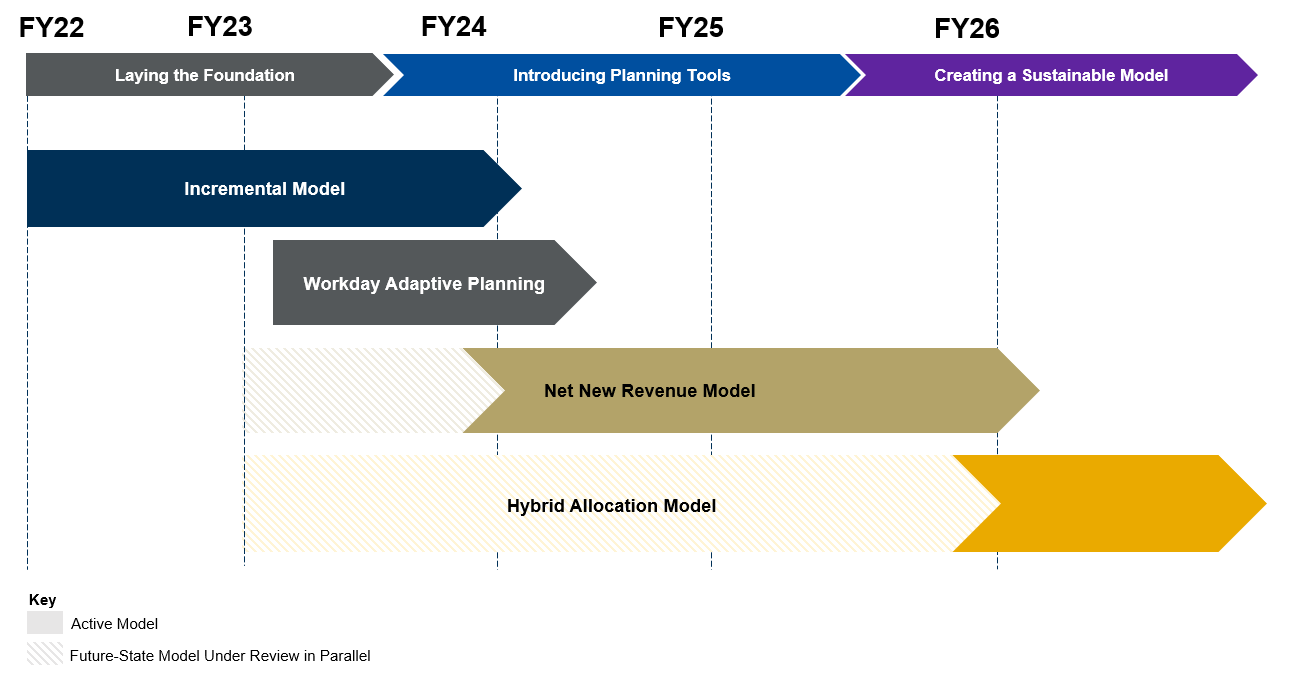The Future of Budgeting
Georgia Tech’s Budget Reform Initiative
Georgia Tech’s 10-year Institute Strategic Plan promotes growth across the Institute. A new budget model is needed that can reward innovation, contain costs, and generate revenue in alignment with strategic goals and priorities.
What Is Budget Reform?
Why Are We Reforming the Budget?
Who Will Budget Reform Impact?
When Will Budget Reform Take Effect?
The budget reform project will update our budgeting process from its current incremental budget model to a Hybrid Allocation Model. The project will take place over four phases:
- Phase 1 – Diagnostic / Current State Assessment
- Phase 2 – Solution Design / Reformed Budget Model + Implementation Roadmap
- Phase 3 – Implementation / Training, Templates, + Go-Live Support
- Phase 4 – Rollout
In alignment with the Institute Strategic Plan, the budget reform effort will implement a new budget model to reward innovation, promote generation of revenue, and encourage cost containment. New planning and forecasting processes will be supported by Workday Adaptive Planning.
Budget reform impacts each college as well as non-college units.
Budget reform will be implemented over the course of five years, beginning with the current state diagnostic that will gradually transition the university from the current incremental budget model to the new Hybrid Allocation Model.
As stewards of the Institute’s financial landscape, we embark on the budget reform initiative with a steadfast dedication to efficiency, equity, and the pursuit of academic excellence. Through collaboration and strategic resource allocation, we aspire to empower our community, ensuring a sustainable and vibrant future for all Yellow Jackets.
We are ushering in an opportunity to align our strategic academic goals with our new budget model to advance the Institute’s overall mission. As our colleges deliver strategic priorities and serve our students, they will simultaneously be rewarded.
Our Roadmap
The budget reform project will use the Parallel Process to transition to the new Hybrid Allocation Model. During the Parallel Process (FY23-FY25), the legacy budget model is used to make resource allocations while the new model is run in parallel for analysis purposes only. The Parallel Process will allow Georgia Tech leadership to review the Institute’s operating budget as if it were allocated under the Hybrid Allocation Model. This will allow for a period to refine and adjust the model to correct for any unintended consequences before the model goes live in FY26. This will also allow us to introduce new planning and reporting tools such as Workday Adaptive Planning before fully implementing the Hybrid Allocation Model.
The Net New Revenue model is an interim model that will distribute net new state appropriations and tuition revenues through a funding formula. It will be used during the Parallel Process period in FY24 and FY25. It will allow for the equitable transition from the old Incremental Model to the new Hybrid Allocation Model during the Parallel Process.
The Parallel Process will be used in budget years FY24 and FY25. It will be phased out with the implementation of the new Hybrid Allocation Model in FY26.

Our Principles
The following guiding principles set the direction for the Budget Reform effort and serve as the project’s north star throughout solution design, implementation, and in support of the budget model well beyond go-live.
Need more information?
Questions? Comments? Feedback?
Send us a message.
